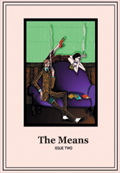I have in my hands Issue Two of The Means, a new literary magazine. Purple Post-It® notes flap out from certain pages, but I’ll get to the journal’s choice bits in a minute. First let us reflect on the meaning of The Means.
The Internet has drastically changed our relationship to knowledge and information, but for literature we still turn to books. I suspect that having a solid object to hold and read from is integral to the way we want to ingest long works. Though millions of us happily read newspapers on the Web, looking at a computer screen is not a comfortable way to read for a long period, nor is it conducive to the state of absorption that we usually want from a book.
The continuing popularity of printed magazines, for their part, can be largely attributed to convenience. In a waiting room, or taking the train to work, people want to flip through short, easily digested articles in something that’s disposable.
Whither, then, the literary journal? Can a printed book-magazine hybrid maintain readership in the digital age? Old brands and habits die hard, and I wouldn’t expect venerable titles like The Paris Review and Poetry to vanish anytime soon. The Council of Literary Magazines and Presses lists hundreds of members. Still, it might well be seen as folly to be starting a litmag in the age of Google and Wikipedia. So when a new journal publishes its Issue Two, one can’t help being a wee bit impressed.
Co-editor Tanner Higgin declares that while The Means is “labeled a literary journal, our editorial direction has no allegiance to mere fiction and poetry. Rather, we read everything sent to us and choose what’s good. It truly is as simple as that… interviews, lists, essays, humor, art, comics, and anything else that can be slapped onto a piece of paper are fair game.” Alas, he goes on to abuse the language he has implied that he loves: “The truth is that most [literary] publications are running on a shoestring budget with no readership and thus function as poorly compensated, careless behemoths with little to no interest in costly innovation or the acceptance of risky writing by unproven writers.”
That’s what not having an editor for the editor gets you. But out of a sense of obligation I soldier on, and there turns out to be a lot of good work between the pink covers. A sharp little short-short story by Joelle Renstrom captures the sense of fascination a young person can have with a larger than life, tall-tale-telling relation. Poignant stories by Mike Magnusson and Jennifer D. Munro illustrate how connecting with other humans can pose awful difficulties whatever the state of one’s love life. Christopher Monks’s story “Lloyd: New and Improved” brings to mind both the gloom of Raymond Carver’s depressing slices of life and the sticky-sweet grittiness of Updike’s sexual tales.
Arthur Salzman contributes an engrossing essay on juggling as a metaphor for life, with imagery that goes to some unexpected places: “And sooner or later the juggler stumbles and grows sullen, the bowling ball having crashed through the breakfront, the hamster having tumbled and scuttled under the refrigerator, the hacksaw having become embedded in her husband’s neck.” Michael Nowacki reports on the Iraq War with an unusual slant, while Andrew Michael Roberts’s metafictional dialogue with his computer illuminates the human-machine interface circa 2006:
I delete nothing. I send each received message – each documenting a lived moment – to the “saved messages” file. To where, any time I choose, I can return and re-live. In this way, I, myself, am “saved.” I am multiplied in the re-living. So that out amid the cosmic swirl of time and being swirl innumerable, “saved” me’s.
Imprecise language, to be sure, but evocative.
Filling out the volume are some poetry and curiosities of varying merit. I haven’t mentioned everything, but you may fairly infer that while Higgin and co-editor Christopher Vieau are themselves but fledgling writers, their energy and taste are having good results. The contents justify The Means.
